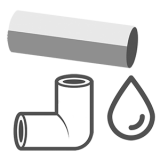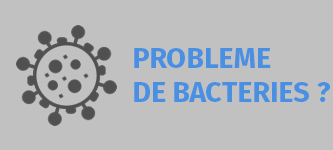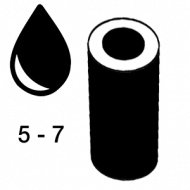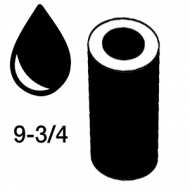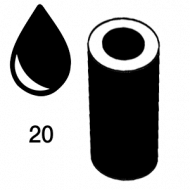| » » » |
Que recherchez-vous ?
What is activated carbon?
Activated carbon is very effective in removing contaminants, odors and bad tastes from tap water. This is precisely why charcoal is often used in the water filtration process.
Activated carbon is small pieces of carbon, in the form of pellets or blocks, which have been treated to be extremely porous. One gram of activated carbon has a surface area of 500 to 3000 m2. To put that into perspective, four grams of activated carbon equals an entire football field. And it is precisely the enormous surface area of the carbon that makes the carbon filter so incredibly effective at absorbing and removing impurities and more from the water.
This is how activated charcoal works
When water flows through a carbon filter, chemicals are trapped in the carbon, resulting in cleaner water. The effectiveness of the activated carbon will depend on the instantaneous flow and the temperature of the water. Therefore, most filters should be used with low pressure, cold water.
Activated carbon works very effectively at removing at least 81 chemicals, effective at another 30, and moderately effective at 22 chemicals. Activated carbon is also recommended for removing organic pollutants, THMs, pesticides and herbicides. However, there are pollutants that activated carbon cannot and cannot remedy.
Vegetable activated carbon is most often made from coconut shells.
Activated carbon cartridge action
The charcoal cartridge is designed for the purification of kitchen tap water for drinking. It is also used as a water treatment system for the supply of drinking water in independent housing. It can be made from hardwood or coconut shell, depending on the actions sought on the elimination of a pollutant.
Most often, carbon filters are produced in the form of multi-layer block cartridges. The outer part is first wider and then gradually tapers into a mesh. They serve to contain mechanical impurities. The inner part of the activated carbon cartridge will deal with harmful substances, such as pesticides, THMs such as chloroform and many VOCs which are components of gasoline, solvents and industrial cleaning agents. The cartridge must be replaced periodically, because it can be saturated by the impurities still present in the water, and because of bacterial development.
- elimination of bad taste and unpleasant smell of tap water rust removal
- retention of organic elements, including microorganisms
- elimination of chlorine from mains water and other products used for water disinfection.
What is a Granular Activated Carbon (GAC) Water Filter?
Granular Activated Carbon Water Filter GAC stands for "Granular Activated Carbon" and is made up of small loose carbon granules. GAC filters are commonly used as a "polishing filter" in the water filtration process and are very effective in improving the taste and odor of drinking water.
While a GAC carbon filter is simply made of loose carbon chunks, a carbon block filter is where the loose carbon chunks are compressed into a filter.


